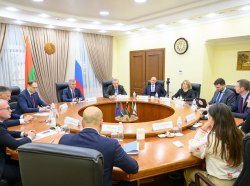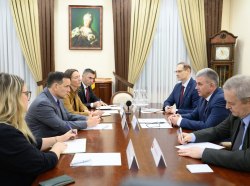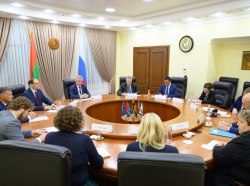Tiraspol, 7 December. /Novosti Pridnestrovya/. The 11th European Russian Forum was held on 3-4 December in European Parliament, Brussels. Its main topic this year was “EU 2017 and Russian Revolution 1917: lessons not learned well”. Pridnestrovie was represented by deputy speaker of the Supreme Council Galina Antyfeyeva and foreign minister Vitaly Ignatyev.
In her speech, Galina Antyufeyeva noted the high symbolism of the Russian forum being held in the EU's capital, "which is close and clear to us in Pridnestroviу which is geographically located in Europe, while feeling itself an integral part of the Russian world."
She also told about the role of the Russia-led peacekeeping operation in Pridnestrovie. She recalled that it was the presence of Russian peacekeepers that maintained peace in the country and provided security guarantees to each Pridnestrovian.
"Today we are all witnessing the way Russia is regaining the role of a security and stability guarantor throughout the world and becoming a centre of attraction for old and new allies. It is obvious that Russia's strengthening is causing the fierce resistance of its opponents who influence a number of ex-Soviet countries in order to prevent the restoration of the Russian world in its historical limits," underscored Antyfeyeva.
Pridnestrovie is facing serious pressure today on the part of its neighbours. It is no secret that Moldova and Ukraine are rapidly implementing Western rules and regulations, which do not only concern the economy and politics but also affect the very fabric of society. Historical memory is being revised; anti-Russian sentiments are being imposed; the civilisational and cultural codes of these peoples are being deformed, Antyfeyeva noted.
While the neighbouring countries —Moldova and Ukraine — are seeking their historical, ethnic and geopolitical identity, Pridnestrovie remains true to the choice of its people, made at the 2006 referendum — independence and integration with Russia, Antyufeyeva recalled.
According to her, the mythical idea of joining the EU, coupled with the illusory benefits of "European association", has already led to the tragedy in Ukraine, social and political clashes in Moldova, as well as the break-up of historical economic and trade relations with Russia. This has led to increased poverty and poverty in these countries.
"I wish to take the opportunity to appeal from this high rostrum to our European partners. We often hear Brussels spokespersons say that the EU is not involved in geopolitics but promotes and defends European values. Please stay consistent and opt out of double standards. The EU is sponsoring today the establishment of Moldo-Ukrainian posts at the Pridnestrovian border, which along with the restrictions already imposed on our economy will result in irreparable social losses for hundreds of thousands of Pridnestrovian residents, carries political risks and threats to stability," noted Antyufeyeva.
She also added that with the acquiescence of the European Union, Moldova and Ukraine were violating or threatening to violate the rights of Pridnestrovians to free movement, free humanitarian and economic development. At the same time, the official website of the European Parliament proclaims respect for human dignity and human rights, freedom, democracy and equality as the EU's core values.
"The EU's policy towards Pridnestrovie seems especially ambiguous amid high international legal instruments," said Antyufeyeva, citing some of the provisions of the UN Declaration on the right to development.
She also said that over the past 200 years Pridnestrovie's history had been directly related to the border status of our region between west and east, between Russia and European states.
"We were able to fully benefit from the periods of Russian-European cooperation and suffer the gravity of losses during the periods of confrontation between Europe and Russia. So we, as no other in our region, are interested in maintaining a system of stability and security, including economic and humanitarian dimensions. There are two competing projects in the region — the European and Eurasian integration models. Whether they will be mutually exclusive or, perhaps, a mechanism of interaction of these systems will be found in the future remains unclear," said Antyufeyeva.
She suggests this could be another topic for an enhance dialogue, and "thus another opportunity to eliminate a new confrontation in the zone of the Moldo-Pridnestrovian conflict, to use the potential for recovering interregional economic relations, to establish venues for political cooperation between the major international actors, especially Russia and Europe."
"All this could gradually become a universal means of preventing regional conflicts and reaching agreement in Europe," concluded the deputy speaker.








